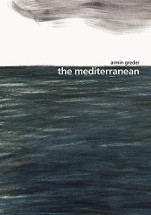The Mediterranean by Armin Greder

Allen and Unwin, 2017. ISBN 9781760630959
(Age: all) Highly recommended. Themes: Refugees, Mediterranean Sea,
Drowning, Corruption, Civil war, Wordless stories. In a scathing
attack on the almost faceless men who sell guns which support war,
in turn producing a constant stream of refugees, Greder forces every
reader to stop and take notice, to reevaluate, to empathise with
those who through no fault of their own, are pawns in the hands of a
group of men whose sole aim is to make money; the sharks of our
society.
Guns are produced and then shipped in large containers, almost
clandestinely to men waiting at the other end. They use the guns to
force people to fight for them and people are killed and villages
are burnt down in their wake. People stream away from the danger in
their midst and find men who sell them a way out, passage on a boat
across the Mediterranean Sea. But they do not make it.
The men who sell the guns, then sit down in the most expensive of
restaurants to eat the fish that have grown fat on the bodies washed
down deep into the sea after their boats have failed to take them to
safety. The sharks who sell their guns, or war, or safe passage are
no different from the sharks which eat the bodies in the sea.
Greder's breathtaking mixed media illustrations delineate the
problem: the making of money overrides everything. We are all at the
mercy of the sharks for whom money is king, and it is no mistake
that these faces who sell the guns, rouse the people into fighting,
sit at the restaurant to eat their fish meal and sell safe passages
to the displaced, are all the same.
Greder's illustrations are arresting. The cover shows the sea, black
and forbidding, overhung with grey clouds. Opening the book we find
a body floating down, down to the bottom of the sea where it becomes
fish food. Every page is filled with sombre greys and blacks, white
used to accentuate the bleakness of the situation for those trying
to survive.
Alessandro Leogrande's afterward tells the tale in all of its
horror, the throwing back into the sea of bodies found on the beach,
the many thousands which wash up each year, the very dehumanising of
these people as we use statistics to define what is happening. And
we are all complicit in our silence. This heart wrenching book is
not designed to sit on shelves. It must be shared and discussed. Teacher's
notes are available on the publisher's website.
Fran Knight